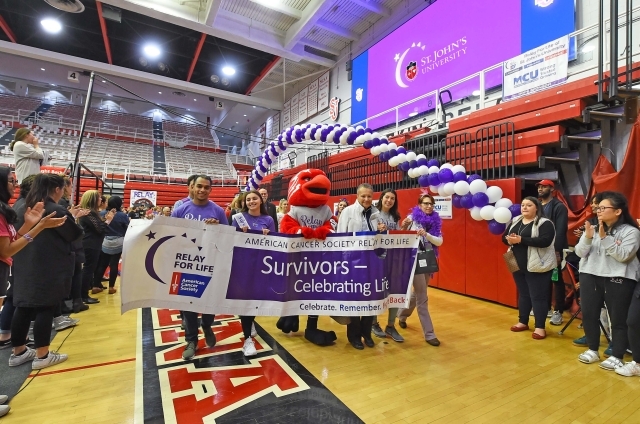
Over 1,400 students joined together to raise more than $154,000 for the fight against cancer at St. John’s 13th Annual Relay For Life®—a new record for the University, which has supported the event since 2006.
“Relay For Life is a night when members of the St. John’s community unite in celebration and remembrance, and most importantly—to fight back against cancer,” said Mary H. Pelkowski, Associate Dean for Student Engagement. “It is our commitment as a Vincentian institution to continually answer the call of St. Vincent de Paul of ‘What must be done?’. Tonight, my fellow Johnnies, we have done just that.”
The event benefited the American Cancer Society and ran from 6 p.m. on Friday evening until 6 a.m. Saturday. Throughout the night and the early morning hours, participants representing 84 teams, student clubs, and Greek organizations marched around the perimeter of the basketball court inside Carnesecca Arena on the University’s Queens campus, in support of those who have been affected by cancer.
For the first time in seven years, the keynote address was delivered by a student—cancer survivor Natalie Collura, a sophomore from Corinth, NY, majoring in Advertising Communication.
At 10 years of age, Natalie was diagnosed with a stage four Wilms tumor, a rare form of kidney cancer. “I had no idea what cancer was; I was just focused on being in fourth grade and playing Nintendo,” she said. Natalie underwent seven hours of surgery at Memorial Sloan Kettering Cancer Center to have the tumor removed.
“I woke up to IVs coming out of me from everywhere, a feeding tube, and a morphine needle up my back,” she recalled. “The pain was indescribable.”
After six months of radiation therapy and chemotherapy, Natalie was declared cancer-free.
“At only 10 years old, I went through something that nobody should ever have to experience,” she said. “But at 20 years old, I’m confidently able to say that I wouldn’t change the way my life panned out.”
She explained, “Cancer has given me much more than it took from me. Cancer gave me my voice, and it gave me purpose. It changed my perspective on life. It’s not often that you get a second chance at life, and cancer gave me the eyes to see that. So, if you want to tell somebody you love them, don’t hesitate. If you want to change your life—then take the first step and believe that you can.”
After a video displaying the names and images of cancer victims and survivors, students encircled the court with hundreds of glowing luminaria—each representing a life taken by cancer, a survivor of cancer, or support for a person still fighting the disease.
“This year, St. John’s University celebrates over a decade of Relaying, and we are hoping to have another record-breaking year,” said Meaghan Neary, Senior Community Manager, American Cancer Society. “St. John’s is still the only school in the New York metro area to hit the million-dollar mark.”
Since 2006, St. John’s students have raised more than $1.2 million through Relay For Life.
Melissa Marietto, a Pharmacy major from Farmingdale, NY, has participated in Relay For Life since she was a freshman in high school. “When I came to St. John's, I wanted to give back to the community and raise money for a cause that touches everyone,” she said. “Cancer is a roller coaster ride and Relay For Life helps us reflect on all the highs and lows that people with this disease face every day.”
St. John’s Staten Island campus is hosting its own Relay For Life on Friday, April 20, where sophomore Michele Seidenfaden, a Childhood Education major, will be walking for two members of her family who have been touched by the disease. “Cancer has affected so many people I know and love,” said the Staten Island, NY, resident. “It’s what inspired me to join Relay For Life and support the American Cancer Society’s mission.”
“Cancer affects all of us,” said Lillian Black, a senior from Minisink, NY, who is studying Childhood Education at the Queens campus. “It doesn’t care what school we go to, how old we are, or where we’re from. Even though we’ve made a lot of progress in overcoming it, there is still work to be done.”
